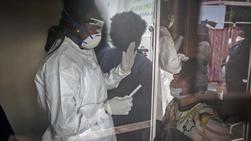 A medical worker of a test station takes samples of a woman for COVID-19 infection test in Johannesburg, South Africa, on April 3, 2020. (SHIRAAZ / XINHUA)
A medical worker of a test station takes samples of a woman for COVID-19 infection test in Johannesburg, South Africa, on April 3, 2020. (SHIRAAZ / XINHUA)
African countries came out in strong support on Wednesday for a day dedicated to making the world safer for women.
The International Day for the Elimination of Violence against Women provided an opportunity for countries to take stock of how far they have come since the Fourth World Conference on Women was held in September 1995, when the Beijing Declaration and Platform for Action was adopted.
The Beijing Declaration was an agreement signed by 189 governments in Beijing. It sets out a comprehensive guide to combating the barriers to gender equality in the world.
To mark the day, the African Union organized a virtual event known as the High-Level Intergenerational Dialogue in which the Africa Young Women Beijing+25 Manifesto was unveiled.
Building on the gains made since the Beijing Platform for Action was established 25 years ago, the manifesto provides a platform of a common set of demands for the attainment of gender equality.
ALSO READ: UN Women chief: COVID-19 threatens gender equality gains
Jeannette Kagame, the first lady of Rwanda and keynote speaker at the event, called for young people to seek inspiration in the fight against beliefs and norms that keep women down.
We need inspiration from you the youth to dismantle these detrimental beliefs and norms and we must also challenge the fact that gender equality is yet to be achieved.
Jeannette Kagame, Rwanda's first lady
"As a mother and grandmother young at heart, I feel for you. I feel that this dialogue today is not only timely, it is essential," Kagame said.
"We need inspiration from you the youth to dismantle these detrimental beliefs and norms and we must also challenge the fact that gender equality is yet to be achieved."
She reminded them that areas of concern that put African young women and girls at a disadvantage are linked to poverty, inequality of economic opportunity, as well as exclusion from decision making.
"Why should we, in 2020, which marks the 25th anniversary of the Beijing Declaration and Platform for Action continue to accept the fact that globally women aged between 25 and 34 are 25 percent likelier than men to live in extreme poverty, that men still control more than three-quarters of seats in parliaments around the world, that girls and women continue to be subjected to female genital mutilation?" Kagame asked.
Close connection
Phumzile Mlambo-Ngcuka, the UN Women executive director, pointed out the close connection between the COVID-19 pandemic and the rise in reported violence, especially against women.
"If only ending men's violence against women was as simple as vaccinating against it. If only responding to it was as well funded as our response to the virus and its impacts on our societies and economies," Mlambo-Ngcuka said.
"Imagine if we invested the same amount of expertise and energy in finding a sustainable, global solution."
On the Africa Young Women Beijing+25 Manifesto, Aya Chebbi, the African Union's youth envoy, told participants in the online event that its demands need to be acted upon in concrete terms.
"This manifesto calls for the criminalization of gender-based violence in all its forms including femicides, rape, female genital mutilation and early and forced marriage, as well as gender discrimination, especially against women in vulnerable settings," Chebbi said.
Among the demands of the manifesto are equality in employment, jobs with dignity, paid work, paid internships and paid maternity leave for women without discrimination.
It demands universal access to essential sexual and reproductive health rights and services, mental health services that understand women's issues better, and inclusive equitable and quality education. The manifesto also calls for efforts to ensure that women are treated with equality before the law.
READ MORE: Full text of CSHRS article on gender discrimination in US
Contact the writer at otiato@chinadaily.com.cn


